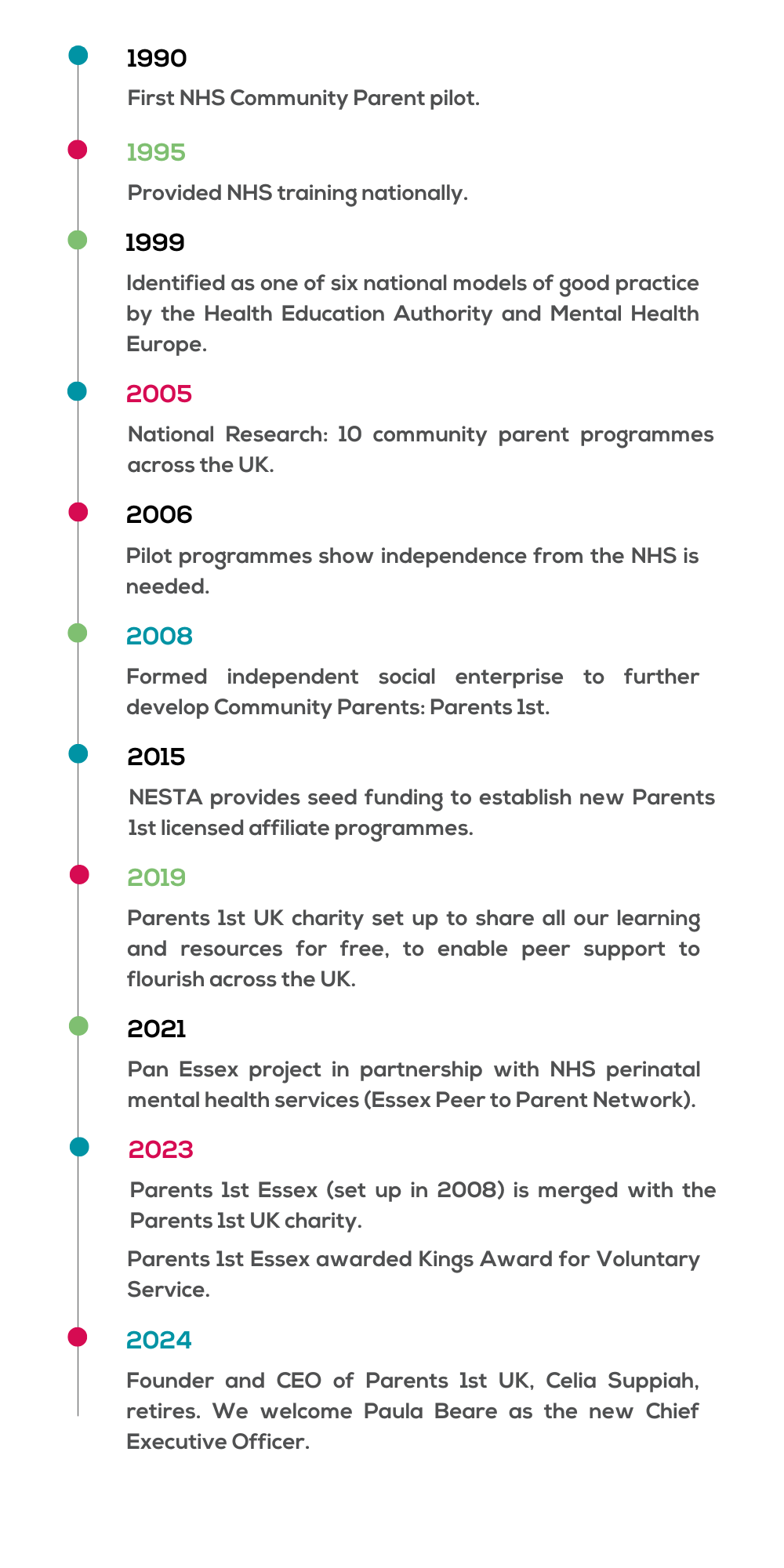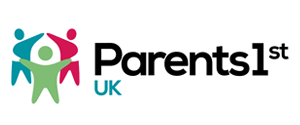Written by Celia Suppiah, Founder of Parents 1st
I started working in Thurrock in the 1980s as a midwife and then as a health visitor in Tilbury in 1987 – getting to know families in Tilbury was a profound experience for me. Many parents were facing hardship but were wary of professionals. They feared that as a health visitor I might judge them to be ‘bad mothers’ and would inform social services. No matter how I tried to reassure local mothers and build up a relationship – this barrier was always there. Things came to a head one day when I visited a mother in one of the tower blocks – when I knocked on the door, she looked through the peephole and I could hear her whispering: “It’s that lady again from the welfare again”.
Parents are the most important people in children’s lives. There had to be a better way of supporting parents who were wary of who they perceived to be “the authorities”. So I started thinking about different and more imaginative ways of offering support to mothers that would help them give their babies the best possible start in life.
One approach that inspired me was the Community Mothers Programme in Dublin – this had developed in the early 1980s. A health visitor had recruited and trained local volunteer mothers who offered peer-to-peer support to other mothers in their own communities using a well-researched child development programme. I successfully applied for some NHS funding to pilot a similar programme in Tilbury. This became the start of our journey... A group of local mothers in Tilbury volunteered to work with me to develop the project. They could engage with local mothers because it was a relationship of ‘equals’ – they were visiting as local mothers, not as professionals, and this made them unique. They could reach local mothers in ways that I couldn’t. For example, one of the mothers had 8 children and had lived in Tilbury all her life. She was well known and respected in the community – she had ‘street credibility’.
I developed a training and supervision programme that enabled the volunteer mothers to deliver home visits to other mothers in their community. One of my health visitor colleagues agreed to be the trainer. The Community Mothers learnt to deliver semi-structured home visits during which they shared ideas (in the form of humorous cartoons) about child development and emotional wellbeing and supported mothers who were struggling to set achievable goals. We worked together to identify needs in their community and creative ways of addressing them.
Working with these committed volunteer mothers opened my eyes even more to how local mothers perceived the health visiting service. This was not easy for my health visitor colleagues to accept and some were very antagonistic to the project. This was also the case for some of my line managers in the NHS.

From 1990 when the project started to 2004, I had 11 different NHS line managers. Some of them loved the project, but some put me under enormous pressure to discontinue it. I had a young daughter myself and was juggling with working part-time and carrying a caseload whilst also developing the project.
I developed much of the project in my own time. It had taken off and practitioners in other areas of the country started hearing about it and started to visit us. I carried out a local evaluation which was published in the Health Visitor journal, and I was asked to present the project at a national health visitors conference. I took 5 of the volunteer mothers with me and we presented the project together as a group to 500 health visitors – there were mixed reactions…
It was getting increasingly difficult to manage the project whilst also being responsible for a caseload as a health visitor. I had to find a way of developing the project properly. I successfully applied for a 2-year grant from the Health Foundation. This supported me to take some time out to develop the project and work with 9 other practitioners across the country who had started coordinating their own Community Mothers initiatives as part of the government Sure Start initiative.
We worked together to consolidate the volunteer recruitment, training, supervision, and operating standards. We called the project “Community Parents” to be more inclusive of fathers and we created a monitoring and evaluation framework and collected data together over a one-year period. This showed that when the volunteer Community Parents started developing trusting relationships with mothers during pregnancy, the outcomes for parents were even better after the birth.
Despite the excellent benefits we were demonstrating for both volunteers and parents, many of the coordinators experienced problems when government Sure Start funding was cut. Some of them lost their jobs and those that were health visitors had to go back to carrying caseloads. It was very demoralizing but there was a determination amongst us to carry on somehow. They wanted a national organization to champion the Community Parent Programme. This was one of the reasons why I decided to create Parents 1st as an independent organisation.
Working as a health visitor in Tilbury was becoming untenable for me personally during 2007. I had a change of line manager again and my working life became intolerable. By this time, several of the volunteer Community Parents had gained employment on the project as development workers. We had moved out of Tilbury clinic and taken over shop premises in Tilbury high street. Mothers could pop in and the project was well supported and embedded in the community.
My lifeline was the Director of Nursing at the time. She was inspired by the project. We spent many evenings talking on the phone – this got me through a very difficult period in my working life and in 2008 I made the decision to resign from the NHS – I had to walk away from the project in Tilbury as it operated under the umbrella of the NHS.
I had no salary for almost a year. I developed Parents 1st as a Community Interest Company (CIC) working alone in my dining room at home.
It was very important to start creating a Board of directors to carry the heavy responsibility for management and governance. A long-standing colleague from the National Childbirth Trust and a retired NHS manager I had worked with agreed to become volunteer directors. The Director of Nursing arranged for me to have a copyright license for everything I had developed whilst working in the NHS.
Once the CIC was created, I started applying for grants to develop a new “Community Parent” programme in Essex. I also carried on planning the national development work. I had a breakthrough when I managed to get a national Dept of Health grant for £200k. I began developing a new Community Parent Programme starting in pregnancy. This also included a Birth Partner element so that the most vulnerable mothers would have a volunteer by their side during labour and birth. A volunteer doula programme was operating in Hull at the time and they helped me to develop this aspect.
2010 was another milestone - the local NHS commissioners in Basildon and a local authority commissioner in Thurrock awarded Parents 1st its first NHS contract to implement the new Pregnancy Pal and Birth Buddy programme. Working in partnership with Basildon Maternity Unit, another health visitor (retired) joined me to develop the new offer of personal, one-to-one peer support (home – hospital – community) to vulnerable mothers and their partners starting as early as possible during pregnancy until 3 to 6-months post birth. This is how our new local peer support programme started in South Essex.
I also set up a national City & Guilds accreditation centre so that we could start offering opportunities for volunteers to gain a Level 3 vocational qualification based on their learning and skills developed in the natural volunteer setting. Local coordinators trained to be assessors. Over the past 10 years over 50 volunteers across the country have gained the qualification. City & Guilds withdrew the qualification last year, so we decided to create our own new one which is customized to the Perinatal Peer Support role – a huge piece of work that has now been approved by a new awarding body called NCFE. It is now getting off the ground and 10 other peer supporter initiatives across the country have expressed an interest in it!
Some key milestones for Parents 1st:
2013: We won the UnLtd Big Venture Challenge
2015: The NESTA and Cabinet Office Social Action Innovation Fund supported us to develop two new perinatal peer support programmes in Tower Hamlets and Derby based on the success of our programme in Essex.
Over the years, with some careful selection and some luck, some amazing Trustees have joined our Board. All of them are volunteers and their strategic roles are crucial. We owe them a huge debt of gratitude. Whilst they may be less visible to staff and volunteers, they do a huge amount of voluntary work in the background, giving skilled guidance and support. We are very lucky to have such a supportive Board.
There are numerous exceptional VCS organisations Celia came across since leaving the NHS and was humbled by what they do and the expertise they have. But one drawback can be a tendency to compete with each other for limited grant opportunities which undermines the potential to share our learning with each other. Our Trustees tasked Celia to research and advise on new ways forward and at a CIC Board meeting in 2018, we decided to turn things on their head and adopt an “Open Source” model.
We know that when peer support initiatives are managed, resourced, and delivered well, there are huge benefits not only to mothers, fathers, partners, and babies but also to professionals involved in their care. Our mission is to enable more quality perinatal peer support initiatives to flourish but we understand only too well the barriers (time, resource, knowledge) that can get in the way. We decided to share everything we have learnt openly with others.
2019: We were given grant funding to create a new charity and website to share everything we had developed in Essex. We believe our “Open Source” approach to sharing everything we do is one of the reasons why we are exceptional as an organization. At this point, the charity needed to concentrate on developing the website as a ‘space’ dedicated to sharing good practice in perinatal peer support across the country. The platform has lots of innovate software developed by a small company called Made Open who share our ethos of building strengths in communities.
Since creating the website, it has benefited numerous other peer support initiatives (Derby, Tower Hamlets, Hackney, and Lewisham to name just a few) and we worked with commissioners and providers in Kent and Dudley, providing consultancy and workshops to help them build new perinatal peer support initiatives in their communities.
2022 was a time to reflect. We still had the Community Interest Company (CIC) set up in 2008 (trading as Parents 1st) and also the new charity that was set up in 2019 (Parents 1st UK – which had just 2 employees). We had to have two separate Boards, two separate accounts and reporting requirements. Wouldn’t it be better to have everything under one umbrella? There would be lots of benefits of merging the CIC with the charity (more economical to run for a start, a totally charitable legal form, and more grant funding opportunities as a result). Hence a decision was reached to merge the two legal entities.
18 January 2023: the date Parents 1st Essex and Parents 1st UK merged. We were very lucky to have a legal firm working with us on a probono basis to make sure this happened smoothly.
2023: We were notified that our flagship Essex programme had been awarded the King's Award for Voluntary Service! A huge achievement for us as an organisation and well-deserved recognition for all our exceptional volunteers and staff's hard work in supporting parents. Our official award ceremony took place in May 2024.
2024: Celia made the difficult decision to retire. Paula Beare joined us as our new CEO in August 2024.
I hope this gives you a snapshot of the history of Parents 1st, and what we have achieved as an organization over the years so far…

